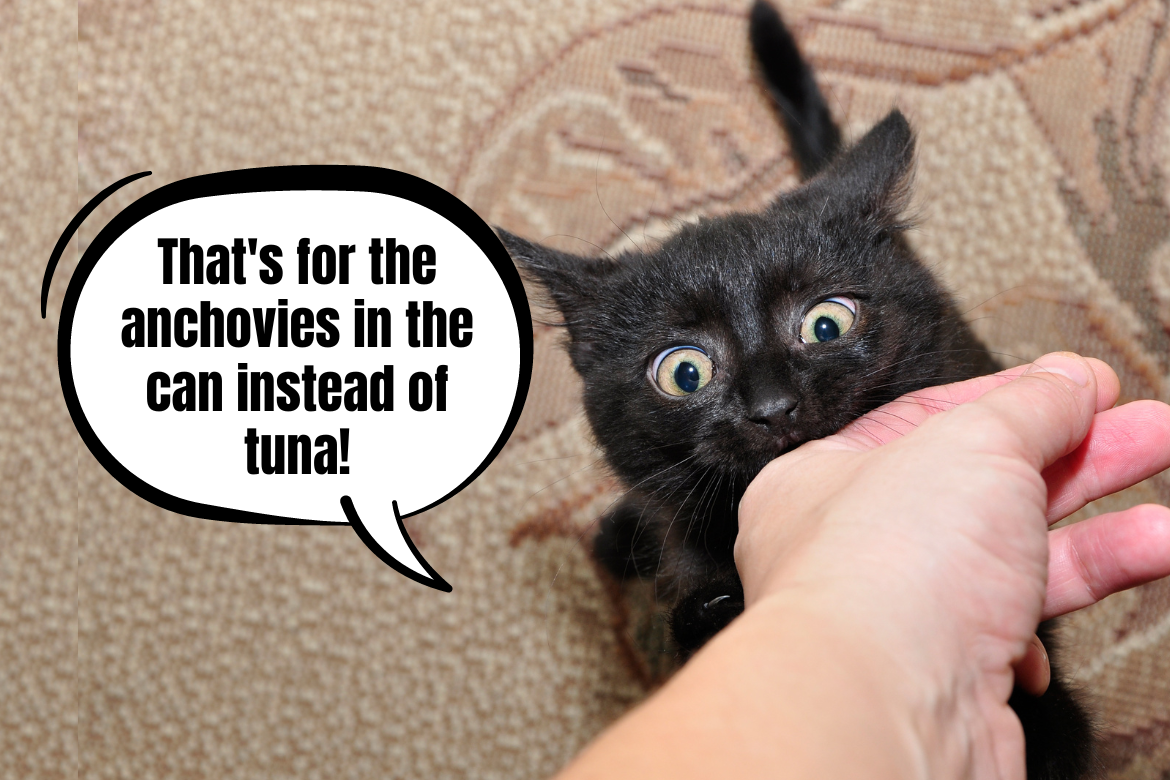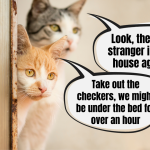Petting, shared naps on the couch, training, playtime – spending time with the cat is the best way to build a beautiful relationship with our feline friends. And we bet every fabCat will agree that a cat asking for pets and cuddles is the best feeling in the world. But as it is with cats, sometimes felines change their minds in a blink of an eye and though they initiate cuddles themselves, a moment later they go into paw fights or even bite our hands or feet! Today, dear fabCats, we’ll be finding out why cats don’t always treat us gently and how we can minimize the risk of a close-call meeting with the cat’s teeth. Come on and find out with us 🙂

Playtime or aggression? All about cat habits of biting hoomans
Cats are not aggressive by nature. Born hunters, but also potential prey of bigger predators, cats generally avoid conflict and only opt for a direct clash as a last resort. And despite that, we often hear stories about cat Carers being bitten and scratched by their cats and wonder: why does it happen? Is it the hooman’s fault for not noticing the warning signs and violating the cat’s private space? Or maybe the cat has a very particular way of playing? There may be many reasons for a cat to attack their Carer, but it’s never a cat being “mean” which people often accuse cats of.
When a cat gets offensive, their actions are usually a reaction to particular stimuli: fear, frustration, boredom, being overstimulated, in pain, or feeling discomfort, but it could also be a clear sign of a cat’s hunting instincts. A cat could “unexpectedly” bite our ankles when we pass by to entice us to play with them (a sign of boredom). They could attack our hand with their teeth when we present it as if it’s a toy (hunting). A cat has the right to react by biting and scratching if they’re just chilling and we decide to pet them on their exposed belly (frustration and overstimulation). Cat attacks because they got scared, irritated, or simply because they’re in pain and can’t handle it.

If we were to analyze all that happened before an attack, it would be pretty obvious that the cat’s actions are not random and the cat’s body language was clearly showing their irritation, fear, frustration, or readiness to play. And that’s why knowing a cat’s body language is so important for both beginner and experienced cat Carers.
Why does my cat bite my hands?
Accounts of cats biting their Carers could be split into two categories: ones that happened during playtime, grooming, and direct interactions and ones which seem completely random. Let’s take a closer look at them:
Cat bites during playtime, snuggling, brushing, and direct interactions.
As we established by now, a cat’s “aggression” is usually a result of the cat reacting to particular stimuli – situations which they don’t agree with, don’t accept, don’t understand, or ones that make them too excited or frustrated. It can happen that a cat bites us during playtime. Why? Because instead of picking up a toy, we wiggle our fingers in front of the cat and make them their prey. The cat won’t fight their instinct just because it’s our hand and you shouldn’t attack a hooman. The hunting instinct is much stronger than reason!
Sometimes unexpected contact with a cat’s teeth happens when we pet them, brush them, or do any grooming activities. Why is that so? A cat’s body is very sensitive to touch and although some felines love being pet, one false move could make the cat feel threatened, overstimulated, or frustrated and make them want to stop the petting session. And to make you stop, the cat needs to let you know about it. When swatting their tail, trying to walk away and quiet growls don’t help, the cat might go into something more direct – loud growls, scratching, and biting. Their teeth might also come into play when a cat is particularly sensitive to the touch in certain areas or if something hurts them and you touching the spot only makes it worse.
When a cat bites “unexpectedly”.
A second category is “unexpected” bites and here the situation is more difficult because sometimes it actually seems like the cat could bite us just randomly – attack our ankles when we passed by, surprise us by jumping from behind the couch, jump up on the bed and bite our legs under the duvet, scratch us when we walked close to the window sill they were resting on. Where do these random attacks come from? They’re usually a way to get a certain reaction from us (a cat attacks because they want to play and the foot moving under the duvet makes for a perfect toy) or it’s a direct reaction to something happening outside that has nothing to do with us – we were just there, within paw’s reach, when the cat was watching the birds out the window and couldn’t get to them.

Don’t get surprised – when a cat could actually bite you?
A prepared fabCat is not easily surprised so now let’s sum up the topic of cat bites in a few simple points that will make it easier for you to predict and avoid a first-degree encounter with cat teeth. Among the most common causes of cats biting hoomans are:
- Kitten habits. For young kittens, “wrestling” is their favorite type of play – it allows them to learn how to interact with other cats, respect their boundaries, as well as strengthen their relationship with each other. If we were to start playing with kittens with our hands, the young ones will immediately remember wrestling their siblings and will treat our hands the same. It’s always better to get a toy into play and a true master of close encounters with cat teeth and claws is our KUNG FU cat toy.
- Boredom. Cats need to move around and play to satisfy their needs for hunting and although sometimes they seem to be lazy couch potatoes, playtime is a crucial element of a cat’s everyday life. If we don’t make sure that our cat has something to do in their life, they will instinctively try to use their energy up on scratching your couches, knocking things off the shelves, chewing on plants, or coursing you into playtime by attacking you unexpectedly.
- Overstimulation. When petting comes into play, every cat has their boundaries. Some might want pets for hours on end, others have enough after just 5 minutes, and some cats will let you know with their teeth as soon as you touch them one time too many. The better you know your cat’s level of tolerance, the smaller your risk of getting bitten is.
- Frustration. It’s definitely one of the more difficult cat emotions but every cat Carer should be aware of it. Cats can get frustrated by a game they don’t understand, a situation they can’t change, or even by watching birds outside the window knowing they can’t catch any. Observe your cat’s body language and act before they get irritated – invite your fur to play, distract them from a stressful situation, and redirect their energy to something they love doing. And remember: never take your cat out of a frustrating situation by force, by taking them in your hands or petting – this is you asking to get bitten.
- Health issues. We can’t forget to mention them as sometimes it’s pain, hurt, or behavioral issues that make our cats get aggressive when we least expect it. If you don’t see any valid reason for your cat’s attack, start by looking for the source at the vet.

What to do when your cat bites you?
Cat bites are never fun, regardless if they’re just a little nibble during playtime or a full-fledged attack by a stressed-out cat. No matter the reason, we should never react with anger, shouting, or punishing the cat – our feline friends don’t understand our anger, won’t connect the punishment to their own behavior, and could actually lose their trust in us if we react angrily. So what can one do to eliminate the risk of getting bitten in the future?
- If a cat attacks out of boredom, paws at us because they want to play, or bites us when we entertain them with our hands, the answer is simple – let’s redirect their attention to a more appropriate toy. Don’t encourage your cat in any way to hunt your feet, your hands, or you if you want to keep all your digits intact 🙂
- If a cat attacks while you pet them, pay attention to which spots are annoying the cat the most and what signals the cat sends your way while you pet them. Maybe the petting session was simply too long and you didn’t react when the cat wanted you to stop. Cats are experts at showing if they don’t like being touched. The question is: can we read their language?
- If a cat attacks “by surprise”, unprovoked and it’s not at all their style, let’s think about what could’ve caused that burst of aggression. Was the cat triggered by loud noises at home? Or maybe they were annoyed by the other cat and redirected the reaction to you? Could the cat be hurt and let you know about it by acting up?
Some stressful situations could be avoided before they happen by simply adjusting the cat’s environment and everyday routine. Enriching their surroundings with extra scratchers, shelves and toys gives them the space to spend their energy. Hideaways let your cats safely run away from a stressful situation. Regular playtime and interactions with the Carer strengthen the cat’s relationship with their hoomans and make it easier for us to read the cat’s body language when we need to.
Do you, fabCats, have ever experienced getting a cat teeth “stamp” during playtime or cuddles? What did you do about it? Let’s discuss this in the comments.




